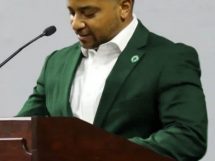
By Jacqueline Pitts, The Bottom Line
Presidents from three of the state’s universities spoke openly with legislators Thursday about the impact proposed budget cuts and program eliminations would have on their faculty and communities at a meeting of the House Budget Review Subcommittee on Postsecondary Education.
University of Kentucky President Eli Capilouto was first to present at the meeting and began his remarks by expressing his growing respect for tough choices legislators have to make but added he hopes these decisions are made in a timely way because many people would like to have certainty of salary and position, which are impacted by state budget cuts.
Capilouto explained that the 6.25% proposed cut presented by Gov. Matt Bevin earlier this month would mean a $16 million reduction from their $267 million allocation from the state.
The program eliminations proposed by the governor, Capilouto said, is another $10.2 million cut as six UK programs are up for elimination and two programs are suggested for reduction. The UK president said these programs have resulted in the creation of many startups and businesses in the state.
He went on to mention eight other programs that could potentially impact the University of Kentucky and said the university would like more clarification on that issue.
Capilouto pointed to the university’s efforts in the areas of workforce and economic development and other areas while noting to legislators that 25% of all students at the University of Kentucky come from families with an average income of less than $20,000 per year, so these dollars matter.
Concluding his remarks, Capilouto stated the University of Kentucky wants to be a partner with the legislature in this budget process with a focus on recruiting and retaining talent in Kentucky and continuing needed public efforts the university provides.
University of Louisville President Gregory Postel said the proposed cuts could bring the university’s funding levels back down to where it was in 1998 with the 6.25% reducing the state allocation of more than $132 million by $1.3 million in FY 2018 and $6.9 million in FY 2019.
Postel also noted the impacts of proposed program eliminations with six programs at UofL on the chopping block, including lung cancer research and the Kentucky Autism Training Center. He also added that under the proposed budget, the university will eliminate multiple projects including two dorm projects, a new College of Business building, and three STEM building projects.
UofL’s president said the school plans to continue their emphasis on revenue generation to ensure the optimization of function while also increasing student enrollment to ensure tuition doesn’t have to increase and other areas.
However, he said, those efforts to find funds will take time and any immediate decrease in allocation has an adverse impact on the university. To combat this, Postel says the university will focus on things like improvements in operational efficiencies and the consideration of selective programmatic elimination.
Kentucky State University President M. Christopher Brown II, who began his tenure at the university in May 2017, said the university’s $26 million allocation would see a $3.1 million reduction with the proposed 6.25% cut and unfunded pension needs costing more than $1.3 million, which he said totals a more than 11% cut to the school. Brown said they have struggled to meet their pension obligations, noting the shared struggle among many state agencies in recent years.
Brown stated the budget cuts would not necessarily be the “death nail” in the university but that it would cause many issues for the school’s ability to function.
In terms of progress made by the university in recent years, Brown said they have increased graduation and retention rates across the board and plan to continue their work in those areas.
Brown said his goal as the new president of the university is to reacquaint stakeholders with the importance of the school on all levels and educate people about the unique attributes offered by KSU.
After hearing presentations from the university presidents, many legislators on the committee expressed a desire to ensure both K-12 and postsecondary education are not hurt too severely in the budget process. Now with the governor’s budget proposal in hand, the General Assembly is tasked with crafting the final version of the next two-year state budget before the end of the 2018 session.





















Add Comment